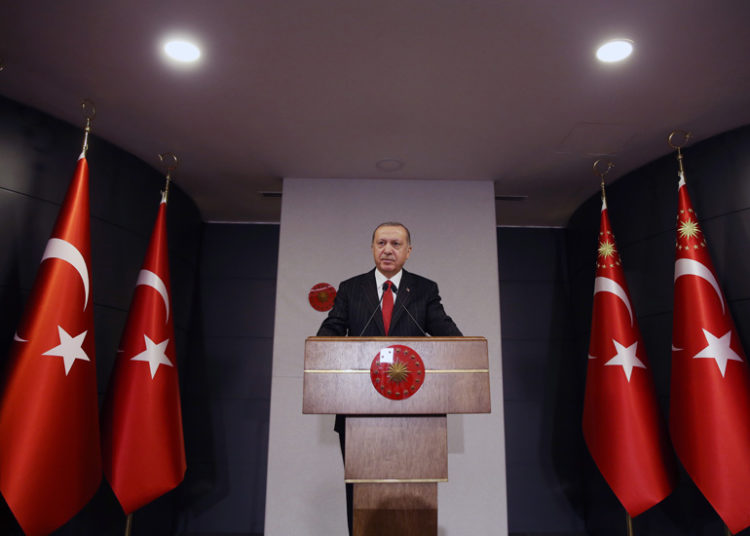Nordic Monitor
In making reference to the National Tax Orders (Tekalif-i Milliye Emirleri) of the 1920s, President Recep Tayyip Erdoğan sent a clear signal that the Turkish government might take advantage of the coronavirus pandemic to expand its seizure policy, which has targeted the assets of Erdoğan critics since a coup attempt in July 2016.
Since the abortive putsch, the Turkish government has systemically been impoverishing dissidents, and their assets, including real estate, chattel, bank accounts, intellectual property and other financial assets, have been transferred to the Treasury by the courts based on fabricated terrorism charges.
Following a cabinet meeting on April 6, President Erdoğan reminded the Turkish people of the obligatory tax orders that were issued to meet the needs of the Turkish army, saying, “We are a nation that sacrificed all its possessions for freedom in accordance with the National Tax Orders issued under the signature of Gazi [Veteran] Mustafa Kemal Atatürk.”
President Erdoğan underlined the importance of these orders in his speech, saying, “I would like to remind you of the National Tax Orders containing 55 articles under 10 chapters: A national tax commission will be set up in each city and district; each household should supply underwear, socks and shoes [for the army]; 40 percent of all clothing of merchants and households will be confiscated and will be paid for later; 40 percent of food items will be confiscated and will be paid for later; blacksmiths, foundries, carpenters and all industrial workshops should work for the army; all vehicles belonging to citizens should provide free military transportation to a distance of 100 kilometers each month; all abandoned properties will be seized; weapons and ammunition should be delivered to the army within three days; 40 percent of fuel and machine spare parts will be seized; and 20 percent of all livestock will be confiscated.”
Last week Erdoğan announced a “national solidarity campaign” instead of imposing a nationwide curfew as expected, calling on citizens to make donations for people who have lost their jobs due to the coronavirus pandemic. While global economies have begun to deliver a robust fiscal response to tackle the outbreak, the Turkish government sees donations as a significant source for the fight against the pandemic.
On August 7, 1921 Mustafa Kemal Atatürk, commander-in-chief and speaker of parliament at the time, issued 10 decrees that together became known as the National Tax Orders, with which he revealed the determination of the national leadership to conduct a total war to achieve the nation’s goals.

President Erdoğan’s remarks received criticism from the opposition and critics alike. The leader of the newly formed Future Party, Ahmet Davutoğlu, a former prime minister and one-time close ally of the Turkish president, strongly criticized Erdoğan‘s statement, saying: “Today, this analogy is wrong and dangerous. The period of stability that we’ve enjoyed since 2002 [when the ruling Justice and Development Party (AKP) came to power] should not end with the National Tax Orders.” According to Davutoğlu, the orders were used to raise the threshold of national sacrifice.

Fox TV news anchor Fatih Portakal tweeted about the issue, saying that he couldn’t rule out the declaration of another set of National Tax Orders.
“I wonder if the funds in people’s deposit and savings accounts will be demanded under the pretext of ‘We are going through difficult days’ by reminding them of the National Tax Orders. Maybe they will promise to pay it back after the [the COVID-19 pandemic]. I can’t say that it will not happen, unfortunately,” Portakal tweeted on April 6.
President Erdoğan and the Banking Regulation and Supervision Agency (BDDK) filed a complaint against Portakal accusing him of attempting to manipulate the people.

In a speech delivered from Istanbul’s remote Huber Mansion, where he has been isolated since the coronavirus outbreak, President Erdoğan said: “We have not only the means but also the morale and determination to defeat this pandemic.”
“Each emerging development shows the magnitude of the threat we are faced with and how it is necessary to comply with the measures we have taken,” he said.

President Erdoğan declared a war against the Gülen movement in the aftermath of corruption investigations in 2013 when he, his family members and business and political associates were incriminated in a major graft case that involved an Iranian sanctions buster and a Saudi al-Qaeda financier. Erdoğan managed to hush up the case by removing the prosecutors and police investigators. In an attempt to shift the blame, he called the graft probes a coup against his government and accused Fethullah Gülen, a US-based Turkish Muslim scholar, as the man behind them. Gülen strongly denied having any role in the investigations.
The crackdown on the Gülen movement intensified in the aftermath of the July 2016 coup attempt. The assets and wealth of individuals, corporations and organizations that were seen as affiliated with the movement were branded as war spoils open to plunder. The assets of Gülen-affiliated entities such as schools, universities, media outlets, companies and apartment buildings were confiscated or stolen by their new owners.
Turkey’s Savings Deposit Insurance Fund (TMSF) has taken over 885 private companies including major conglomerates such as Boydak Holding, the Koza Ipek Group, Kaynak Holding, Naksan Holding, Suvari Co, Dumankaya, Akfa, Orkide and Sesli, valued at close to $11 billion. No figures are available verifying how much personal wealth and how many assets were seized through the Erdoğan government’s use of the partisan judiciary.












